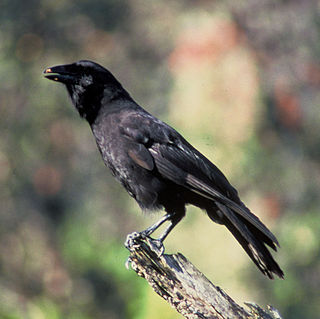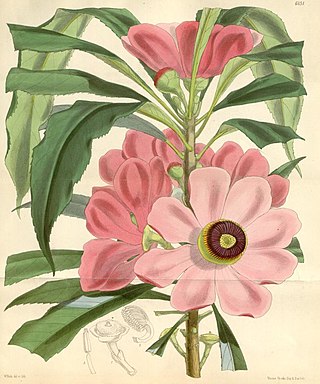
The International Union for Conservation of Nature (IUCN) Red List of Threatened Species, also known as the IUCN Red List or Red Data Book, founded in 1964, is an inventory of the global conservation status and extinction risk of biological species. A series of Regional Red Lists, which assess the risk of extinction to species within a political management unit, are also produced by countries and organizations.

A species that is extinct in the wild (EW) is one that has been categorized by the International Union for Conservation of Nature as only consisting of living members kept in captivity or as a naturalized population outside its historic range. Classification requires exhaustive surveys conducted within the species' known habitat with consideration given to seasonality, time of day, and life cycle. Once a species is classified as EW, the only way for it to be downgraded is through reintroduction.
Gustavia acuminata is a species of woody plant in the family Lecythidaceae. It is found in Brazil and Venezuela. It is threatened by habitat loss.
Gustavia dodsonii is a species of woody plant in the Monkeypot Family (Lecythidaceae). It is found only in Ecuador. Its natural habitats are subtropical or tropical moist lowland forests and subtropical or tropical moist montane forests. Its most remarkable feature are its seeds, which can measure up to 2.9 inches in length by up to 2.25 inches (58mm) in diameter.
Gustavia erythrocarpa is a species of woody plant in the family Lecythidaceae. It is found only in Brazil. It is threatened by habitat loss.
Gustavia excelsa is a species of woody plant in the family Lecythidaceae. It is found only in Colombia.
Gustavia foliosa is a species of woody plant in the family Lecythidaceae. It is found in Colombia and Ecuador.
Gustavia fosteri, one of several plants in the genus Gustavia known by the Spanish common name membrillo, is a species of woody plant in the family Lecythidaceae. It is found only on Barro Colorado Island in Panama. It is threatened by habitat loss.

Gustavia gracillima is a species of woody plant in the family Lecythidaceae. It is found in Colombia and Ecuador.
Gustavia latifolia is a species of woody plant in the family Lecythidaceae. It is found only in Colombia.
Gustavia longepetiolata is a species of woody plant in the family Lecythidaceae. It is found only in Brazil. It is threatened by habitat loss.
Gustavia longifuniculata is a species of woody plant in the family Lecythidaceae. It is found only in Colombia.
Gustavia petiolata is a species of woody plant in the family Lecythidaceae. It is found only in Colombia.
Gustavia pubescens is a species of woody plant in the family Lecythidaceae. It is found in Colombia and Ecuador.
Gustavia santanderiensis is a species of woody plant in the family Lecythidaceae. It is found in Brazil and Colombia. It is threatened by habitat loss.
Gustavia serrata is a species of woody plant in the family Lecythidaceae. It is found only in Ecuador and also Brazil. Its natural habitat is subtropical or tropical moist lowland forests.
Gustavia sessilis is a species of woody plant in the family Lecythidaceae. It is found only in Colombia.
Gustavia verticillata is a species of woody plant in the family Lecythidaceae. Native to the Neotropical realm, It is found in Colombia and Panama. It thrives in wet and tropical environments.

Gustavia is a genus of flowering plants in the family Lecythidaceae described by Linnaeus in 1775. It is native to tropical Central America and South America. Many of the species are threatened; some are critically endangered Gustavia superba, though, is actually abundant in re-growing secondary forests. It grows in northern South America, from Panama south through the Andes as far as Ecuador, and along the Caribbean coast and in the Amazon basin. Gustavia flowers have numerous stamens, in some species as many as 1,200 in a single flower.

A vulnerable species is a species which has been categorized by the International Union for Conservation of Nature as being threatened with extinction unless the circumstances that are threatening its survival and reproduction improve.






